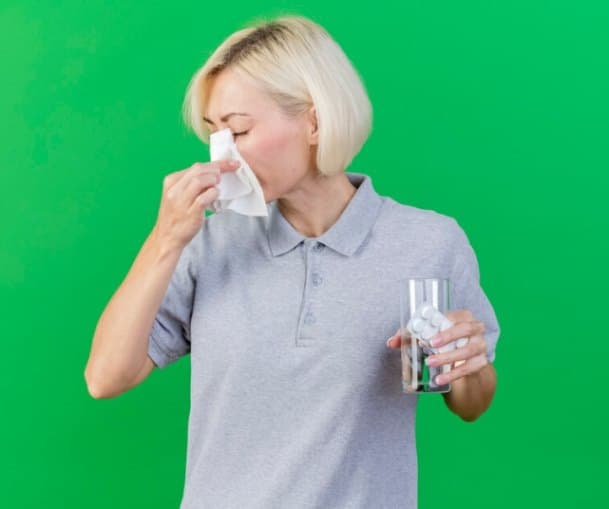Why Does Water Make Me Nauseous?
Water can make you nauseous due to various reasons, including an underlying medical condition or sensitivity to its temperature or taste. Factors such as speed of consumption, or underlying conditions may contribute to this sensation. Opting for smaller sips, adjusting water temperature, or consulting a healthcare professional can aid in finding relief.
Proper hydration is critical for overall health, so finding alternative ways to consume water or addressing the underlying cause is important. Understanding the factors that contribute to this discomfort can help you manage and alleviate your symptoms effectively.
This article will examine some of the possible causes of nausea from water and provide some suggestions for how to stay hydrated better.
Table of Contents
What is Nausea?
Nausea is a complex sensation that is often associated with an upset stomach. It is not a condition in itself, but rather a symptom of an underlying issue. When we feel nauseous, it is our body’s way of alerting us that something is not right.
It can be caused by various factors, including certain medical conditions, infections, medications, or even psychological triggers such as stress or anxiety.
Related Topic: Why Do I Get Nauseous Before I Sneeze?
Causes Of Nausea
When it comes to understanding why water can sometimes make us feel nauseous, it’s essential to consider the potential causes. Here are a few possible reasons:
- Temperature: Drinking water that is too cold or too hot can sometimes trigger nausea. Extreme temperatures can irritate our digestive system, leading to an uncomfortable sensation.
- Volume: Consuming a large amount of water too quickly can overwhelm our stomach and create a feeling of fullness. This can lead to nausea as our body tries to compensate for the sudden influx of fluids.
- Chemical Imbalance: In some cases, nausea might be due to an imbalance of electrolytes in our body. When these essential minerals are imbalanced, it can disrupt our digestive system and cause discomfort.
- Sensitivity: Individuals with sensitive stomachs or underlying digestive disorders, such as acid reflux or gastroesophageal reflux disease (GERD), may experience nausea when consuming water. These conditions can cause the stomach to produce excessive acid, leading to feelings of queasiness.
Although these factors might contribute to feeling nauseous after drinking water, it’s important to note that everyone’s experience is subjective. What triggers nausea in one person might not affect another in the same way.
If you consistently experience nausea after drinking water, it may be worth considering consulting a healthcare professional to determine the underlying cause. Understanding the reasons behind your symptoms can help you make necessary adjustments to avoid discomfort and improve your overall well-being.
Potential Health Conditions Related To Water-induced Nausea
Water-induced nausea may also be indicative of an underlying health condition. While it may not always be cause for concern, it’s important to be aware of potential health issues associated with this symptom. Some conditions that could be related to water-induced nausea include:
- Dehydration: Surprisingly, dehydration can trigger nausea when you consume water after experiencing prolonged thirst. This reaction is due to your body trying to rehydrate too quickly.
- Gastrointestinal disorders: Conditions such as gastroesophageal reflux disease (GERD), gastritis, or Irritable Bowel Syndrome (IBS) can cause water-induced nausea as a result of inflammation or sensitivity in the digestive system.
- Pregnancy: Nausea and vomiting, commonly known as morning sickness, can be intensified by the consumption of water during pregnancy.
- Migraines: Some individuals with migraines may experience water-induced nausea as a symptom during a migraine episode.
Tips To Alleviate Water-induced Nausea
If you frequently experience water-induced nausea, there are several strategies you can try to alleviate this discomfort:
- Sip slowly: Instead of gulping down water, take small, slow sips to avoid overwhelming your stomach.
- Temperature and Consistency: Experiment with different water temperatures and consistencies. Some individuals find that room temperature water or water with added electrolytes is easier to tolerate.
- Assess Water Quality: Check the quality of the water you are consuming. Poor water quality, such as high mineral content or contamination, can contribute to nausea. Installing a water filter or using bottled water can help alleviate the issue.
- Hydration intervals: Rather than consuming a large quantity of water in one go, spread out your hydration throughout the day by drinking smaller amounts at regular intervals.
- Consider Alternate Hydration Methods: If you consistently experience nausea after drinking water, you may consider alternative methods of staying hydrated, such as consuming hydration supplements or opting for water-rich foods like fruits and vegetables.
- Identify triggers: Keep a food and symptom diary to determine if there are specific foods or drinks that trigger your water-induced nausea. This can help identify any potential allergens or sensitivities.
By understanding the factors that trigger water-induced nausea, being aware of potential health conditions associated with it, and implementing practical tips to alleviate the discomfort, you can take control of this puzzling phenomenon. Remember, hydrating your body is crucial, so finding a balance that works for you is key.
Bottom Line
Drinking water is an essential part of our daily lives, but for some, it can lead to feelings of nausea. Understanding why this happens is crucial for finding a solution. From underlying medical conditions to the temperature and quality of the water, there are various factors to consider.
It’s important to listen to your body, consult a healthcare professional if needed, and make necessary adjustments to ensure you can enjoy the benefits of waterwithout the discomfort.
